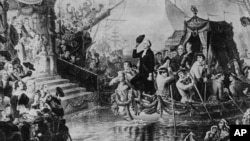The third Monday in February is Presidents Day in the United States. Originally meant to celebrate George Washington, the country’s first President, since 1968 the holiday has also honored Abraham Lincoln. Today it serves as a recognition of all of the nation’s Presidents.
The observance began as a celebration of George Washington’s February 22nd birthday. More than any other figure of his time, Washington guided the future United States through the Revolutionary War and its aftermath, the six-year conflict that ended the country’s colonial beginnings and set it on its new path as a representative democracy.
Indeed, Washington is frequently called the Father of the Country, and not just because he was a successful military leader. Truthfully, his actions in post-war civilian life set a precedent for all those who followed him in the country’s highest office.
He put the nation on a sound financial footing and led the young United States of America through the initial labor pains that quickly gave birth to a stable, democratic, and lawful government. By leaving office voluntarily after two four-year terms, and by ensuring the peaceful transfer of power to the leader elected to succeed him, George Washington set an important precedent for all future presidents.
Were it not for Washington’s guidance, there is a good chance that the United States would not have developed into the country it is today. Similarly, Abraham Lincoln, whose birthday falls on February 12, maneuvered the United States through the Civil War, a conflict that could easily have seen the country break up. But Lincoln’s ability to consolidate public opinion in the Northern states and rally political consensus around the need to abolish slavery resulted in the defeat of the secessionist states and eventually united the country as never before.
Where prior to the Civil War, the United States was just that: a collection of strong political entities united under a relatively weak central government, the country that emerged from four years of bloody fighting stood united under a strong central government.
George Washington and Abraham Lincoln were war-time leaders who recognized the indispensable need for a united people under a strong government. The United States has boasted a number of outstanding leaders – and to be honest, a handful that left much to be desired - but none had the impact of George Washington and Abraham Lincoln.
Today we celebrate their memory, and honor those who upheld their legacy through the centuries since.






